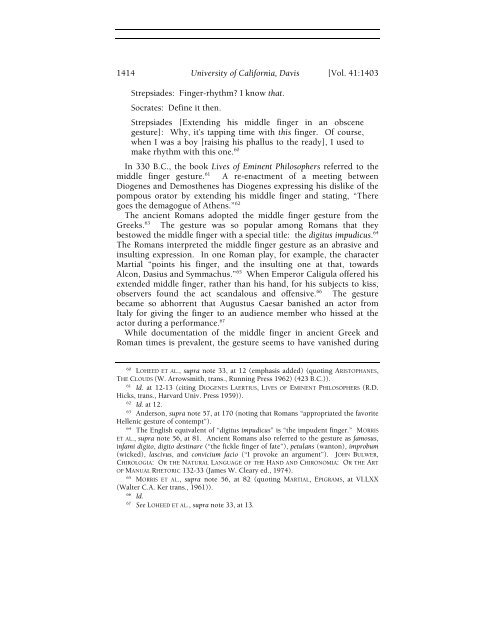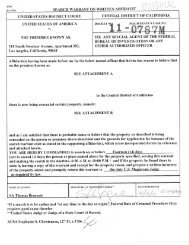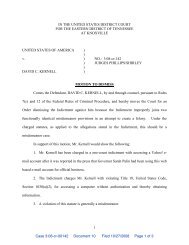Digitus Impudicus: The Middle Finger and the Law - Wired
Digitus Impudicus: The Middle Finger and the Law - Wired
Digitus Impudicus: The Middle Finger and the Law - Wired
You also want an ePaper? Increase the reach of your titles
YUMPU automatically turns print PDFs into web optimized ePapers that Google loves.
1414 University of California, Davis [Vol. 41:1403<br />
Strepsiades: <strong>Finger</strong>-rhythm? I know that.<br />
Socrates: Define it <strong>the</strong>n.<br />
Strepsiades [Extending his middle finger in an obscene<br />
gesture]: Why, it’s tapping time with this finger. Of course,<br />
when I was a boy [raising his phallus to <strong>the</strong> ready], I used to<br />
make rhythm with this one. 60<br />
In 330 B.C., <strong>the</strong> book Lives of Eminent Philosophers referred to <strong>the</strong><br />
middle finger gesture. 61 A re-enactment of a meeting between<br />
Diogenes <strong>and</strong> Demos<strong>the</strong>nes has Diogenes expressing his dislike of <strong>the</strong><br />
pompous orator by extending his middle finger <strong>and</strong> stating, “<strong>The</strong>re<br />
goes <strong>the</strong> demagogue of A<strong>the</strong>ns.” 62<br />
<strong>The</strong> ancient Romans adopted <strong>the</strong> middle finger gesture from <strong>the</strong><br />
Greeks. 63 <strong>The</strong> gesture was so popular among Romans that <strong>the</strong>y<br />
bestowed <strong>the</strong> middle finger with a special title: <strong>the</strong> digitus impudicus. 64<br />
<strong>The</strong> Romans interpreted <strong>the</strong> middle finger gesture as an abrasive <strong>and</strong><br />
insulting expression. In one Roman play, for example, <strong>the</strong> character<br />
Martial “points his finger, <strong>and</strong> <strong>the</strong> insulting one at that, towards<br />
Alcon, Dasius <strong>and</strong> Symmachus.” 65 When Emperor Caligula offered his<br />
extended middle finger, ra<strong>the</strong>r than his h<strong>and</strong>, for his subjects to kiss,<br />
observers found <strong>the</strong> act sc<strong>and</strong>alous <strong>and</strong> offensive. 66 <strong>The</strong> gesture<br />
became so abhorrent that Augustus Caesar banished an actor from<br />
Italy for giving <strong>the</strong> finger to an audience member who hissed at <strong>the</strong><br />
actor during a performance. 67<br />
While documentation of <strong>the</strong> middle finger in ancient Greek <strong>and</strong><br />
Roman times is prevalent, <strong>the</strong> gesture seems to have vanished during<br />
60 LOHEED ET AL., supra note 33, at 12 (emphasis added) (quoting ARISTOPHANES,<br />
THE CLOUDS (W. Arrowsmith, trans., Running Press 1962) (423 B.C.)).<br />
61 Id. at 12-13 (citing DIOGENES LAERTIUS, LIVES OF EMINENT PHILOSOPHERS (R.D.<br />
Hicks, trans., Harvard Univ. Press 1959)).<br />
62 Id. at 12.<br />
63 Anderson, supra note 57, at 170 (noting that Romans “appropriated <strong>the</strong> favorite<br />
Hellenic gesture of contempt”).<br />
64 <strong>The</strong> English equivalent of “digitus impudicus” is “<strong>the</strong> impudent finger.” MORRIS<br />
ET AL., supra note 56, at 81. Ancient Romans also referred to <strong>the</strong> gesture as famosus,<br />
infami digito, digito destinare (“<strong>the</strong> fickle finger of fate”), petulans (wanton), improbum<br />
(wicked), lascivus, <strong>and</strong> convicium facio (“I provoke an argument”). JOHN BULWER,<br />
CHIROLOGIA: OR THE NATURAL LANGUAGE OF THE HAND AND CHIRONOMIA: OR THE ART<br />
OF MANUAL RHETORIC 132-33 (James W. Cleary ed., 1974).<br />
65 MORRIS ET AL., supra note 56, at 82 (quoting MARTIAL, EPIGRAMS, at VI.LXX<br />
(Walter C.A. Ker trans., 1961)).<br />
66 Id.<br />
67 See LOHEED ET AL., supra note 33, at 13.

















